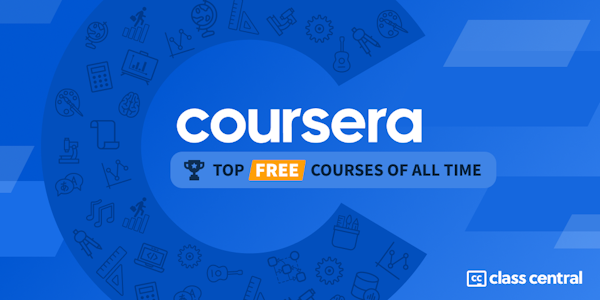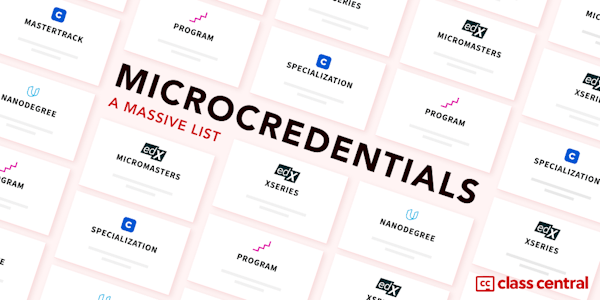Computational Social Science
University of California, Davis via Coursera Specialization
-
1.4k
-
- Write review
Overview
Syllabus
- Offered by University of California, Davis. This course gives you an overview of the current opportunities and the omnipresent reach of ... Enroll for free.
Course 2: Big Data, Artificial Intelligence, and Ethics
- Offered by University of California, Davis. This course gives you context and first-hand experience with the two major catalyzers of the ... Enroll for free.
Course 3: Social Network Analysis
- Offered by University of California, Davis. This course is designed to quite literally ‘make a science’ out of something at the heart of ... Enroll for free.
Course 4: Computer Simulations
- Offered by University of California, Davis. Big data and artificial intelligence get most of the press about computational social science, ... Enroll for free.
Course 5: Computational Social Science Capstone Project
- Offered by University of California, Davis. CONGRATULATIONS! Not only did you accomplish to finish our intellectual tour de force, but, by ... Enroll for free.
Courses
-
This course gives you an overview of the current opportunities and the omnipresent reach of computational social science. The results are all around us, every day, reaching from the services provided by the world’s most valuable companies, over the hidden influence of governmental agencies, to the power of social and political movements. All of them study human behavior in order to shape it. In short, all of them do social science by computational means.
In this course we answer three questions:
I. Why Computational Social Science (CSS) now?
II. What does CSS cover?
III. What are examples of CSS?
In this last part, we take a bird’s-eye view on four main applications of CSS. First, Prof. Blumenstock from UC Berkeley discusses how we can gain insights by studying the massive digital footprint left behind today’s social interactions, especially to foster international development. Second, Prof. Shelton from UC Riverside introduces us to the world of machine learning, including the basic concepts behind this current driver of much of today's computational landscape. Prof. Fowler, from UC San Diego introduces us to the power of social networks, and finally, Prof. Smaldino, from UC Merced, explains how computer simulation help us to untangle some of the mysteries of social emergence. -
This course gives you context and first-hand experience with the two major catalyzers of the computational science revolution: big data and artificial intelligence. With more than 99% of all mediated information in digital format and with 98% of the world population using digital technology, humanity produces an impressive digital footprint. In theory, this provides unprecedented opportunities to understand and shape society. In practice, the only way this information deluge can be processed is through using the same digital technologies that produced it. Data is the fuel, but machine learning it the motor to extract remarkable new knowledge from vasts amounts of data. Since an important part of this data is about ourselves, using algorithms in order to learn more about ourselves naturally leads to ethical questions. Therefore, we cannot finish this course without also talking about research ethics and about some of the old and new lines computational social scientists have to keep in mind. As hands-on labs, you will use IBM Watson’s artificial intelligence to extract the personality of people from their digital text traces, and you will experience the power and limitations of machine learning by teaching two teachable machines from Google yourself.
-
CONGRATULATIONS! Not only did you accomplish to finish our intellectual tour de force, but, by now, you also already have all required skills to execute a comprehensive multi-method workflow of computational social science. We will put these skills to work in this final integrative lab, where we are bringing it all together. We scrape data from a social media site (drawing on the skills obtained in the 1st course of this specialization). We then analyze the collected data by visualizing the resulting networks (building on the skills obtained in the 3rd course). We analyze some key aspects of it in depth, using machine learning powered natural language processing (putting to work the insights obtained during the 2nd course). Finally, we use a computer simulation model to explore possible generative mechanism and scrutinize aspects that we did not find in our empirical reality, but that help us to improve this aspect of society (drawing on the skills obtained during the 4th course of this specialization). The result is the first glimpse at a new way of doing social science in a digital age: computational social science. Congratulations! Having done all of this yourself, you can consider yourself a fledgling computational social scientist!
-
Big data and artificial intelligence get most of the press about computational social science, but maybe the most complex aspect of it refers to using computational tools to explore and develop social science theory. This course shows how computer simulations are being used to explore the realm of what is theoretically possible. Computer simulations allow us to study why societies are the way they are, and to dream about the world we would like to live in. This can be as intuitive as playing a video game. Much like the well-known video game SimCity is used to build and manage an artificial city, we use agent-based models to grow and study artificial societies. Without hurting anyone in the real world, computer simulations allow us explore how to make the world a better place. We play hands-on with several practical computer simulation models and explore how we can combine hypothetical models with real world data. Finally, you will program a simple artificial society yourself, bottom-up. This will allow you to feel the complexity that arises when designing social systems, while at the same time experiencing the ease with which our new computational tools allow us to pursue such daunting endeavors.
-
This course is designed to quite literally ‘make a science’ out of something at the heart of society: social networks. Humans are natural network scientists, as we compute new network configurations all the time, almost unaware, when thinking about friends and family (which are particular forms of social networks), about colleagues and organizational relations (other, overlapping network structures), and about how to navigate delicate or opportunistic network configurations to save guard or advance in our social standing (with society being one big social network itself). While such network structures always existed, computational social science has helped to reveal and to study them more systematically. In the first part of the course we focus on network structure. This looks as static snapshots of networks, which can be intricate and reveal important aspects of social systems. In our hands-on lab, you will also visualize and analyze a network with a software yourself, which will help to appreciate the complexity social networks can take on. During the second part of the course, we will look at how networks evolve in time. We ask how we can predict what kind of network will form and if and how we could influence network dynamics.
Taught by
Martin Hilbert
Charts
- #2 in Subjects / Data Science
- #1 in Subjects / Data Science / Big Data
Reviews
4.8 rating, based on 112 Class Central reviews
-
Great introductory course on Computational Social Science, a fairly new and exciting feel of Social Science.
Martin Hilbert gives a great overview of the computational techniques and social theories that Computational Social Scientists use in their work, from empirical to the analytical, and from theories to simulation.
The course length is sweet, and the material given isn't difficult to understand, although it requires some basic familiarity with maths and using computers.
This course should be taken by anyone who is interested in the field of Computational Social Science. -
It gave bird eye view on several of the topics lab work was little improved than previous courses in the specialization
-
Awesome class! I took it as a UCD student to fill my units in my senior year, turned out I believe this may be one of the best classes to take as a freshman/transfer just yet! Very good intro to different topics in CSS and introduce different possible applications to AI, no coding/math background required for this course, but of course it can lead to very coding/math-intense course if you find it interesting enough to do it for a living. A bit time-consuming for a filler class, but strongly recommended who wants to take a sneak peak in the AI world.
Bonus: the professor is German, so his German humor is a bit of a highlight. It's the kind of joke that you want to laugh but it's hard to laugh, I loved it. -
In this course I learned how social networks evolve, how can we analyse the social network . This learning can be utilised to understand the process of how information be it new knowledge, rumours, fake news spreads in a network. I find this course helpful in applying in social sciences research. I also learned data wrangling that is scrapping data from websites and analyses how they are linked in gephi software. I recommend it for its utility in data analysis in research.
-
Minjoo Lee completed this course, spending 10 hours a week on it and found the course difficulty to be medium.
This course exceeded my expectations tremendously! I was able to learn from professors from every UC campus which gave me expertise knowledge in every area. When I signed up for the course I immediately understood that this course is perfect for people... -
I think is a perfect course for beginners in the subject. You learn to creat an adjacency matrix and to manage gephi, which was my overall goal. The level of the content and the classes was high, and the professor is awesome.
-
Great course to get started with Network Analysis. Good introduction into Gephi (social network analysis software).
Would be good to get same introduction in Netlogo as well. -
I am a student who is interested in studying about social networks and people's behaviours. This course gave me a headstart onto the necessary basics and the tools.
-
Wonderful, very illuminating. So much valuable information to understand our society. I just wonder how this can become a job...
-
The objectives were clear and the exposition synthetic but complete. I strongly recommend this course.
-
Anonymous completed this course.
I took this course through UC cross enrollment 2 years ago . The course content was very up-to-date, and included guest lectures from professors from a very wide range of disciplines, so it would be interesting to students regardless of their majors. Despite not being a student in the social sciences (my majors are in humanities and arts,) this class has equipped me with a lot of basic digital literacy (e.g, present issues of privacy with photo filter apps, epidemic modeling) that has been helpful in everyday life. I hope Prof. Hilbert can make more of his classes available. -
Anonymous completed this course.
Having taken this course as an undergraduate, I can honestly say that this course effectively simplified complex concepts through practical projects. Computational Social Science might seem 'scary' at first, but Dr. Hilbert managed to provide diverse content, superb guidance, and enough flexibility to be creative to make the learning experience sufficiently challenging and extremely rewarding. Whether you're taking this course as first-timer or seasoned researcher, one can narrow or expand their interests while maintaining a comprehensive learning experience.
-
Anonymous completed this course.
This is an excellent course for beginners just learning about computational social sciences, or for those looking to brush up on their knowledge. The course is nicely laid out, with each section featuring an interactive lab relating to social network analysis, that helps you apply what you have learned in a fun, effective way. I highly recommend this course to anyone interested in careers involving social network analysis or human behavior. -
Anonymous completed this course.
This class taught me so much. The most valuable part I found, unfortunately is during this recent pandemic. I found that after taking this class my understanding of the developing social transmission was increased. The assignments helped me understand the graphics being used, because we created similar basic ones in this class. -
Anonymous completed this course.
Each of the courses in the specialization was very rich in content. It has been very interesting to learn the application and interdependence of every aspect covered in this specialization.
More importantly, Prof. Hilbert is very engaging, very well versed with this specialization and lastly..very hilarious! He makes an otherwise tough specialization very enjoyable!
-
Although as interesting as it can be, there are several other things to be done.
First, there are no courses talking about massive online experiments, which is an essential part of computational communication research.
Secondly, the course only touches the surface of the CSS, and lacks systemic introduction of each methods.
The advantages are:
Broaden your views and imaginations about computational methods application in journalism and communication researches.
Secondly, it is very practical, as learners are prepared with many hands-on projects to get a taste of what is like to do CSS and CCS researches. -
Anonymous completed this course.
It would be better if instructor speak more formal.
As learner with English as a second language, prefer meaningful sentences with clear pronunciation! -
I consider the course is very useful, I hope I can learn deeper knowledge about complex network with more mathematical fashion.
-
The course is interesting for students, who didn’t learn social networks. It provides an opportunity to get acquainted with the basics of building, studying and predicting the development of various social networks. Contains a practical exercise using the Webscraper module and the Gephi program (so it is advisable that you have the opportunity to do this work on a PC).
-
The course is very well explained and the assignments can get you in the right way for remembering and practicing. I would suggest a vocabulary as in other courses (with definitions of jargon) and some feedback on the broader path toward a CSS career/skills.








